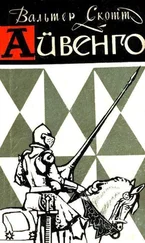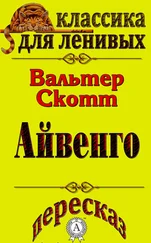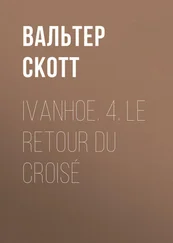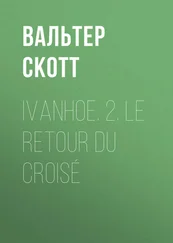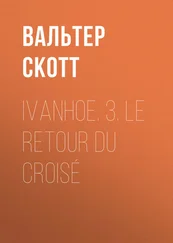1 ...8 9 10 12 13 14 ...26 “Who attacks travellers in this forest?” said he.
“You can go and check whether they are your men or not,” said Wamba, “because they look exactly like you.”
“I will check it right now,” answered Locksley; “and you must not move from this place until I return. Obey me, and it will be better for you and your masters.” He returned in a few minutes.
“Friend Gurth,” he said, “I have seen these men. We cannot attack them right now, but I think I can collect such a force that will be enough to defeat them. You are both servants and, I think, faithful servants of Cedric the Saxon, the friend of the rights of Englishmen. There will be enough English hands to help him in these circumstances. Come then with me, until I collect more force.”
* * *
After a long walk the servants of Cedric with their guide came to a small glade in the centre of which grew an enormous oak-tree. Beneath this tree four or five yeomen lay on the ground. Their guide was welcomed with every sign of respect.
“Where is the Miller?” was his first question.
“On the road towards Rotherham with six men.
“And where is Allan-a-Dale?” said Locksley, who seemed to be the leader of these people.
“Went to the big road to watch for the Prior of Jorvaulx.”
“That is well,” replied the Captain, “and where is the Friar?”
“In his house.”
“That’s where I will go,” said Locksley. “Go and look for your companions. Collect as many as you can. Meet me here in the morning.”
The men went to do what he asked, and their leader with his two companions went to the monk’s hut. When they came close, they heard the sounds of music. “That is well sung,” said Wamba, “but who would ever expect to hear such a cheerful prayer come out from a hermit’s house at midnight?”
In fact at that moment the hermit and his guest were performing an old drinking song as loudly as they could. After some time Locksley’s loud and repeated knocks disturbed them.
“I swear,” said the hermit, stopping his song, “here come more guests. I don’t want them to see what we were doing. All men have their enemies, Sir Knight.”
“Holy Clerk, it is true that all have their enemies,” replied the knight, “so I will put on my helmet.”
“Mad priest,” said the voice from without, “open to Locksley!”
“All’s safe—all’s right, it is a friend,” said the hermit to his companion. He opened the door, and let in Locksley with his two companions.
“Why, hermit,” was the yeoman’s first question as soon as he saw the knight, “what cheerful companion do you have here?”
“A brother of our order,” replied the Friar, “we have been praying all night.”
“Friar, you must lay down your prayer-book,” answered Locksley; “and take up the staff; we will need every one of our men”.
The monk took off his clothes, and put on a yeoman’s dress with a green cloak.
Locksley led the knight apart and said to him: “Don’t deny it, Sir Knight—you are the one who helped the English party win on the second day of the tournament at Ashby.”
“And what if you guess right, good yeoman?” replied the knight.
“I will in that case think,” replied the yeoman, “that you are a friend to the weaker side.”
“Such is the duty of any true knight,” replied the Black Champion.
“A band of villains,” said the woodsman, “in the disguise of better men than themselves, have captured a noble Englishman, called Cedric the Saxon together with the Lady Rowena and his friend Athelstane of Coningsburgh and have transported them to a castle in this forest, called Torquilstone. I ask you as a good knight, will you help us rescue them?”
“I will,” replied the knight.
* * *
When the party which captured Cedric and Rowena stood before the gates of the castle, De Bracy blew his horn three times, and the archers let them in. Cedric and Athelstane were led to a large room apart from their followers.
The Lady Rowena was next separated from her servants, and conducted politely to a distant apartment. The same happened to Rebecca. Her father was dragged off in a different direction. The servants were put in another part of the castle.
Cedric paced the apartment in which the Saxon chiefs were confined, while the apathy of his companion served, instead of patience and philosophy, to defend him against everything except for insufficient food.
“Who would have thought,” said Cedric, “that you, noble Athelstane—that you, descended of Harold’s blood, and that I, whose father was not the worst defender of the Saxon crown, should be prisoners to a Norman, in the castle in which our ancestors held their festivals?”
“It is sad enough,” replied Athelstane; “but I believe they will accept a moderate ransom from us.”
The door of their prison opened, and some servants brought in a table covered with dishes.
“Tell your master,” said Cedric, “that we know no reason he can have for making us his prisoners, except for getting money. Let him name the ransom, and it will be paid.” The chief servant bowed his head.
“And tell Sir Reginald Front-de-Boeuf,” said Athelstane, “that I challenge him to fight with me, on foot or on horse, at any secure place, within eight days after our liberation.”
“I will deliver to the knight your challenge,” answered the servant, “meanwhile I leave you to your food.”
The captives had not long enjoyed their refreshment, however, before they were disturbed even from this most serious occupation by the sound of a horn blown before the gate. The Saxons jumped from the table, and ran to the window, but their curiosity was disappointed – they could only see the court of the castle.
* * *
Isaac of York had been thrown into a cold and wet dungeon. The only light came through a very high and small window. Rusty chains hung from the walls of the prison.
The life of Jews was dangerous and it was not the first time that Isaac was placed in such circumstances. He was prepared for passive resistance. The poor Jew had to wait for three hours before the door of the dungeon opened, and Reginald Front-de-Boeuf, followed by the two Saracen slaves of the Templar, entered the prison.
The baron locked the door. The unhappy Isaac was too weak with fear to rise and bow. Front-de-Boeuf said, “Jewish dog, you will pay me a hundred thousand silver coins.”
“Holy Abraham!” answered the Jew, “it is impossible! – In the whole city of York you will not find such a sum.”
Front-de-Boeuf made a signal for the slaves to approach, and spoke to them in their own language. The Saracens took out from their baskets some coal and made a fire in a large fireplace in the other end of the dungeon.
“Do you see, Isaac,” said Front-de-Boeuf, “these iron bars above the glowing coal? On that warm bed you will lie and roast, if you don’t pay me the money I ask.
“But it is impossible!” exclaimed the miserable Jew.
“Take him, slaves,” said the knight, “and let the fathers of his people help him if they can.”
The Jew looked at the glowing furnace, and he gave up.
“I will pay,” he said, “the money you demand. When and where must it be delivered?”
“Here,” replied Front-de-Boeuf, “here it must be delivered. – You think I will let you go before your ransom is secure?”
“Let my daughter Rebecca go to York,” answered Isaac, “with your safe conduct, noble knight, and as soon as man and horse can return, the treasure will be brought here.”
“Your daughter?” said Front-de-Boeuf, “I gave her to Sir Brian de Bois-Guilbert.”
Читать дальше
Конец ознакомительного отрывка
Купить книгу





